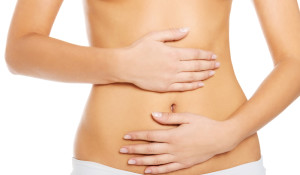 Inflammatory bowel disease (IBD) occurs when the immune system responds to the intestinal flora (bacteria, microbiome) in an exaggerated or disordered way.[8] IBD includes Chron(‘s) disease (CD) and ulcerative colitis (UC). Chron(‘s) affects the both the small and large intestines (“skip lesions”), whereas UC and affects only the large intestine. As with most inflammatory disorders, there is a genetic tendency for developing IBD. The presence of IBD does confer an increased for certain intestinal cancers, and surveillance with regular colonoscopy is necessary, even when the symptoms are well controlled.
Inflammatory bowel disease (IBD) occurs when the immune system responds to the intestinal flora (bacteria, microbiome) in an exaggerated or disordered way.[8] IBD includes Chron(‘s) disease (CD) and ulcerative colitis (UC). Chron(‘s) affects the both the small and large intestines (“skip lesions”), whereas UC and affects only the large intestine. As with most inflammatory disorders, there is a genetic tendency for developing IBD. The presence of IBD does confer an increased for certain intestinal cancers, and surveillance with regular colonoscopy is necessary, even when the symptoms are well controlled.
Classical intestinal IBD symptoms include cramping, irregular bowel habits, possible bowel incontinence, severe urgency, occasionally severe constipation, blood and/or mucus in the stool, or grossly bloody stool. Perianal fistulae/fissures commonly form. Additionally, especially with Crohn’s disease, “extra-intestinal” (outside the intestine) associated symptoms/conditions occur: weight loss, fever, sweats, mouth ulcers, growth retardation (in children), and the classic “skin/eye/joint” problems: uveitis (inflammation of the eye’s iris), joint pain/spinal inflammation (ankylosing spondylitis) possibly liver/gall bladder duct inflammation/scarring/gall stones, and osteoporosis. The skin condition pyoderma gangrenosum can lead to dramatic skin ulcerations. Failure to absorb food often leads to dehydration and/or anemia.
While blood work and imaging studies are important to evaluate the complications of IBD, it is usually diagnosed by endoscopy (camera study) of the intestine with biopsy.
Treating acute flare-ups requires bowel rest (nothing by mouth) and medications including steroids, antidiarrheal and anticholinergic medications, and occasionally antibiotics. Prevention may require very strong medications including steroids, aminosalicylates (sulfasalazine, mesalamine), immunosuppressants (azathioprine, methotrexate, cyclosporine), and/or medications that “soak up” inflammatory chemicals (tumor necrosis factor inhibitors) that are also used to treat autoimmune disease. For those failing medication, surgery (removal of a portion of the bowel) may be required.[1]
In Traditional Chinese Medicine (TCM), all forms of IBD have complex, but common, etiologies. The presenting (“branch”) symptoms of bloody diarrhea with mucus reflect “Damp Heat” in the intestines. As a chronic condition, the “root” of this is “False Heat” pattern lays in significant “Spleen, Defensive, and Kidney Qi deficiencies”. Acupuncture and especially Chinese herbs can be effective adjuncts in IBD treatment; they remove “Heat” and improve “deficient Spleen and Kidney Qi”. Dietary modification is imperative: gluten avoidance and strict adherence to easily digested foods are cornerstones of adjunctive therapy. Dietary modifications as recommended in Ayurveda are valuable in varying the gut microbiome. Ayurveda teaches that eating tasty, easily digested food avoids overtaxing the digestive mechanism so that that “Spleen Qi” remains strong, thus preventing bowel abnormalities.[2, 3]
Inflammatory Bowel Disease Testimonials
Learn more about Inflammatory Bowel Disease (Chron’s and Ulcerative Colitis)
X
These brief overviews of conditions represent distillations of basic and current medical reviews from the following sources:
[1] Conventional Medical Sources
“Harrison’s Principles of Internal Medicine: Volumes 1 and 2, 18th Edition”. Dan Longo Anthony Fauci, Dennis Kasper, Stephen Hauser, J. Jameson, Joseph Loscalzo. McGraw-Hill Professional; (July, 2011)
Medscape eMedicine Physician’s online resource. Various review articles accessed March 2014
Irritable Bowel Syndrome
Jenifer K Lehrer, MD Attending Physician, Department of Gastroenterology and Hepatology, Aria Health System, Philadelphia
Inflammatory Bowel Disease
William A Rowe, MD President, Gastroenterology Associates of Central Pennsylvania, PC; Manager, Endoscopy Center of Central Pennsylvania, LLC; Clinical Associate Professor of Surgery, Division of Colon and Rectal Surgery, Milton S Hershey Medical Center, Pennsylvania State University College of Medicine
Gastroesophageal Reflux Disease
Marco G Patti, MD Professor of Surgery, Director, Center for Esophageal Diseases, University of Chicago Pritzker School of Medicine
Biliary (Gallbladder) Disease
Annie T Chemmanur, MD Attending Physician, Metrowest Medical Center and University of Massachusetts Memorial Hospital, Marlborough Campus
[2], [3]
“Acupuncture Energetics: A Clinical Approach for Physicians”. Joseph M. Helms. Medical Acupuncture Publishers; 1st Edition. (1995)
- “Foundations of Chinese Medicine: A Comprehensive Text for Acupuncturists and Herbalists”. Giovanni Maciocia. Churchill Livingstone; 2 Edition (July, 2005).
- “Diagnosis in Chinese Medicine: A Comprehensive Guide”. Giovanni Maciocia. Churchill Livingstone; 1st Edition (January, 2004).
4. “Chinese Scalp Acupuncture”. Jason Ji-shun Hao, Linda Ling-zhi Hao and Honora Lee Wolfe. Blue Poppy Press; 1st Edition. (November, 2011)
5. Vazquez-Roque MI, Camilleri M, Smyrk T, Murray JA, Marietta E, O’Neill J, et al. A Controlled Trial of Gluten-Free Diet in Patients with Irritable Bowel Syndrome-Diarrhea: Effects on Bowel Frequency and Intestinal Function. Gastroenterology. Jan 25 2013;[Medline].
6. Yamini D, Pimentel M. Irritable bowel syndrome and small intestinal bacterial overgrowth. J Clin Gastroenterol. 2010;44:672-675.
7 Kassinen A, Krogius-Kurikka L, Mäkivuokko H, Rinttilä T, Paulin L, Corander J, et al. The fecal microbiota of irritable bowel syndrome patients differs significantly from that of healthy subjects. Gastroenterology. Jul 2007;133(1):24-33. [Medline].
8 Rioux JD, Xavier RJ, Taylor KD, Silverberg MS, Goyette P, Huett A, et al. Genome-wide association study identifies new susceptibility loci for Crohn disease and implicates autophagy in disease pathogenesis. Nat Genet. May 2007;39(5):596-604. [Medline]. [Full Text].
9 Evans PR1, Bak YT, Dowsett JF, Smith RC, Kellow JE. Small bowel dysmotility in patients with postcholecystectomy sphincter of Oddi dysfunction. Dig Dis Sci. 1997 Jul;42(7):1507-12.
10 Mohammad Reza Farahmandfar1, Mohsen Chabok, Michael Alade1, Amina Bouhelal, Bijendra Patel. Post Cholecystectomy Diarrhoea—A Systematic Review. Surgical Science, 2012, 3, 332-338
http://dx.doi.org/10.4236/ss.2012.36065 Published Online June 2012 (http://www.SciRP.org/journal/ss)
